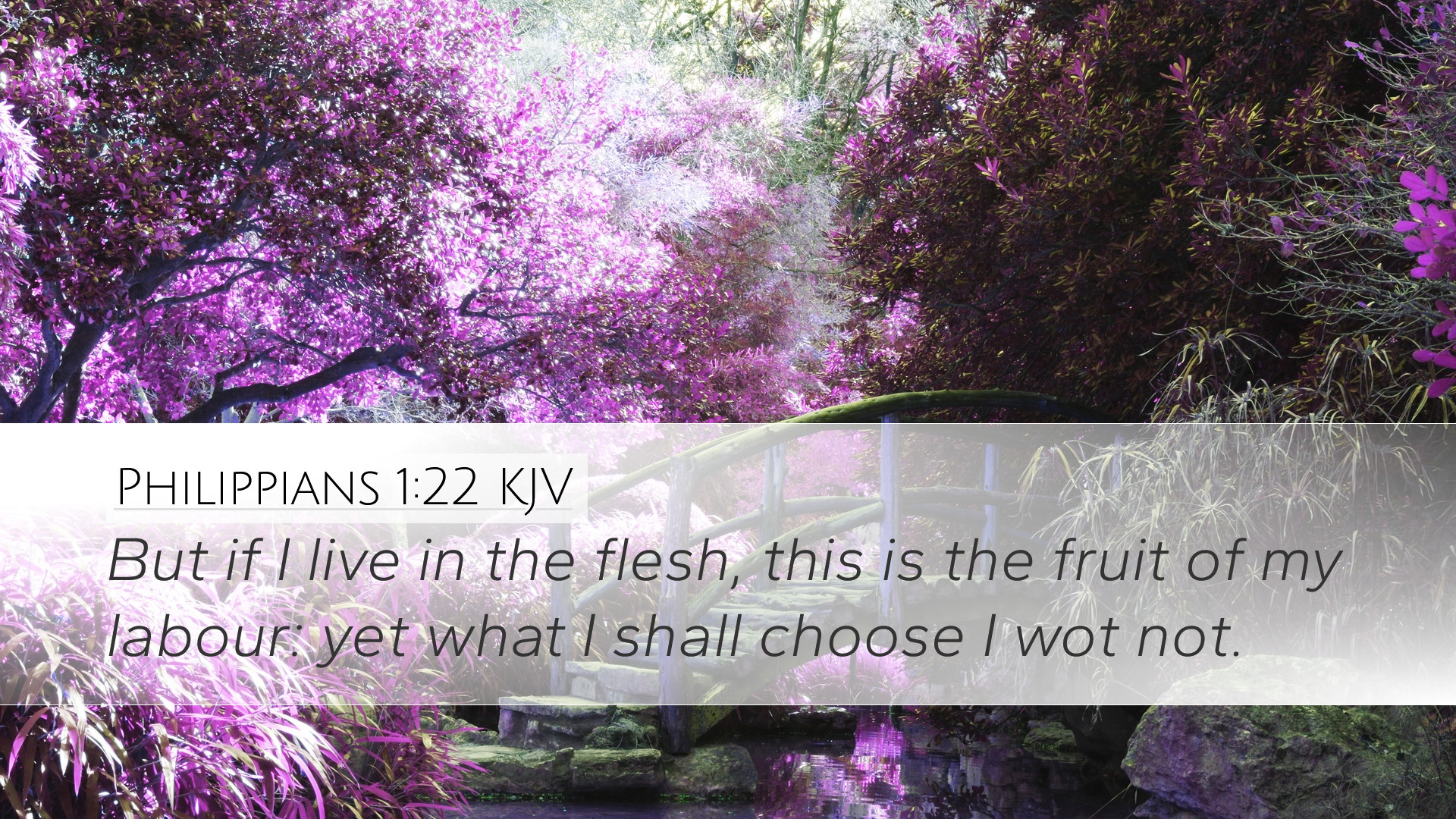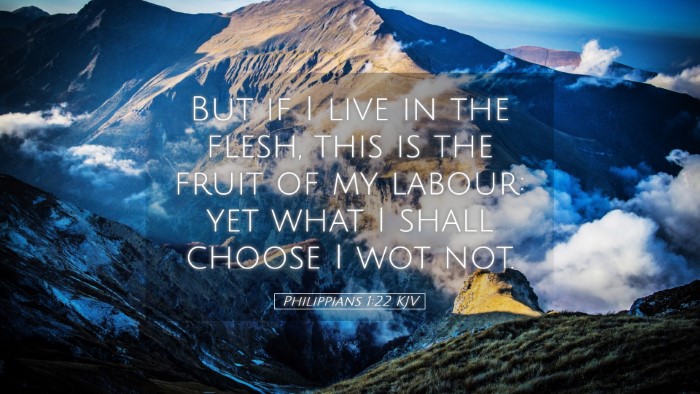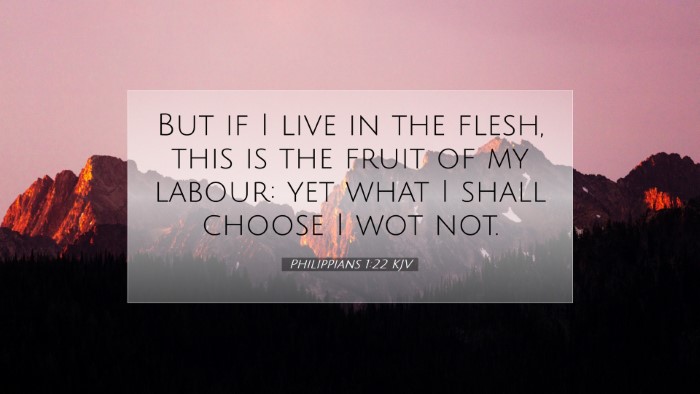Commentary on Philippians 1:22
Philippians 1:22 states: "But if I live on in the flesh, this will mean fruit from my labor; yet what I shall choose I cannot tell." This verse presents profound theological implications concerning life, death, and the purpose of existence, particularly in the context of the Apostle Paul's circumstances while imprisoned. The following commentary will synthesize insights from prominent public domain commentaries, aiming to provide meaningful reflections for pastors, students, theologians, and Bible scholars.
Contextual Background
Paul’s letter to the Philippians is characterized by themes of joy, unity, and the advancement of the Gospel, even amidst adversities. At the time of writing, Paul finds himself imprisoned, grappling with the potential outcomes of his situation—whether to live or die. This context is crucial for understanding the depth of his declaration in Philippians 1:22.
The Duality of Existence: Life and Death
Paul expresses a theological tension: the desire to live, which entails engaging in fruitful labor, against the ultimate release of death, which he perceives as being with Christ. This duality is addressed by various scholars:
- Matthew Henry remarks that Paul is in a dilemma, torn between his earthly ministry and the joy of eternal life.
- Albert Barnes elaborates that “fruit from my labor” indicates the outcomes of Paul's evangelistic efforts, emphasizing that even in his condition, he reflects on the impact of his ministry.
- Adam Clarke adds that Paul’s life choices are heavily influenced by his devotion to Christ and the believers in Philippi, highlighting the significance of serving others.
Interpretations of “Fruit from My Labor”
The phrase “this will mean fruit from my labor” requires a careful theological understanding:
- Henry suggests that Paul views life as an opportunity to yield spiritual benefits, emphasizing that his mission is not in vain.
- Barnes indicates that the “fruit” refers not just to conversions, but to the overall spiritual growth of the community that Paul has nurtured.
- Clarke posits that the “fruit” is a testimony to a life well-lived in Christ, evidencing care for others’ faith journeys.
Life in the Flesh vs. Spiritual Existence
Paul's use of the phrase “if I live on in the flesh” juxtaposes earthly existence with a spiritual reality:
- Henry interprets this as a recognition of the fleeting nature of physical life, contrasting it with the eternal significance of spiritual endeavors.
- Barnes notes that Paul expresses a clear understanding of the transient nature of earthly life, indicating that it is temporary and must be utilized for God’s glory.
- Clarke emphasizes that living “in the flesh” still serves God’s purpose, suggesting that believers' earthly experiences are integral to God’s redemptive narrative.
The Ethical Implications of Choice
Paul’s hesitance to state his choice illustrates a deep ethical consideration:
- Henry discusses the moral complexity of choosing between personal desire and the needs of others, highlighting the selflessness inherent in Paul's thoughts.
- Barnes views Paul's indecision as a reflection of his commitment not to himself, but to the mission God has set before him.
- Clarke argues that the Apostle’s dilemma reveals a profound love for Christ and the Church, shedding light on the sacrificial nature of true discipleship.
Application for the Believer
For modern Christians, Philippians 1:22 invites contemplation about the purpose of life and the nature of choosing to live for Christ:
- Living with Intent: Like Paul, believers are called to live intentionally, understanding that their lives can bear spiritual fruit.
- Balancing Earthly and Spiritual Priorities: The verse encourages believers to find a balance between earthly responsibilities and nurturing their spiritual lives.
- Embracing Sacrifice: The choice Paul faces prompts modern readers to reflect on what sacrifices they are willing to make for the sake of the Gospel.
Theological Connections
This verse also connects deeply to broader theological themes concerning sanctification and the eternal state:
- Sanctification: The fruitfulness Paul refers to can be seen as the ongoing work of sanctification in the believer’s life.
- Hope in Christ: The interplay of life and death illustrates the hope that resides in Christ and the assurance of eternal life.
- Community Impact: Paul’s focus on collective benefit emphasizes the calling of Christian living as inherently communal.
Conclusion
In summary, Philippians 1:22 showcases the Apostle Paul's profound wrestling between the benefits of living on earth versus the joys of eternal life with Christ. The insights from public domain commentaries remind us that every believer is called to live purposefully, produce fruit for God's kingdom, and make choices reflective of Christ's love and mission. As a rich source of theological reflection, this verse prompts all readers, whether pastors, students, or scholars, to seek a deeper relationship with God while actively engaging in the world around them.


